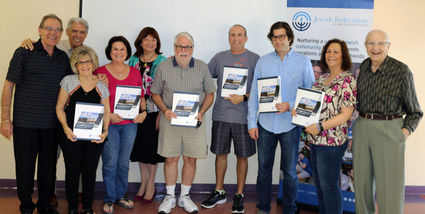Campus 2020 takes aim at Maitland campus debt

Campus 2020 Advisory Board members and Federation leaders met March 27 on the Maitland Jewish Community Campus. From left: Dick Appelbaum, Ron Shader, Dottie Appelbaum, Mardi Shader, Olga Yorish, Dr. Ed Zissman, Allan Goldberg, Michael Soll, Rhonda Forest and Joe Hara.
The Jewish Federation of Greater Orlando (JFGO) has formally launched an ambitious campaign aimed at retiring $4.5 million in debt that saddles the Central Florida Jewish community's core asset, the Maitland Jewish Community Campus.
The goal of the campaign, called Campus 2020, is to retire the debt before Jan. 1, 2020. Early elimination of the debt will result in annual savings of more than $381,000 to the Jewish community. The Roth Family Jewish Community Center and the Jewish Academy of Orlando, both of which call the Maitland campus home, have taken on strategic fundraising roles for the campaign.
Michael Soll, vice president and immediate past president of the JFGO Board of Directors, is the chairman of the Campus 2020 campaign and has spearheaded its planning, which began with consultations in spring 2014.
"The vision of Campus 2020 is to secure the campus and its critical role as the nucleus of our community so that it can continue to foster our vibrancy for generations to come," Soll said. "The insights that our community leaders shared with me during the consultation stage of Campus 2020 were invaluable, and I'm confident our campaign will be successful, in large part as a result of this input."
On March 27, JFGO convened the first meeting of the Campus 2020 Advisory Board on the Maitland campus. The board was briefed on the Campus 2020 strategy and schedule, and reviewed marketing materials for the campaign.
Members of the Campus 2020 Advisory Board are Dick and Dottie Appelbaum; Neal Crasnow and Dr. Susan Drukman; Allan and Diane Goldberg; Joe and Anita Hara; Mark and Caryn Israel; Julian and Sheryl Meitin; Ron and Mardi Shader; and Dr. Edward and Phyllis Zissman.
Two key organizations are playing vital leadership roles in Campus 2020.
The Harris Rosen Foundation has seeded the debt elimination effort through $1 million in matching grants. The $500,000 proceeds from the 2014 sale of the Jack and Lee Rosen Southwest Campus to the Rosen Foundation are also being applied to the debt.
The Jewish Capital Alliance (JCA) has pledged $300,000 in matching funds at 60 cents per dollar, as well as $100,000 in bonus matching gifts that will benefit local agencies. For each dollar donated to Campus 2020 through a qualified Jewish agency or organization, JCA will provide an additional 20-cent matching gift that will be paid directly to the agency/organization that is designated by the Campus 2020 donor.
The participation of the Rosen Foundation and JCA has moved the finish line considerably closer for JFGO.
"We are looking at an overall debt of $4.5 million," Soll said, "but thanks to the generosity of the Harris Rosen Foundation and JCA, and taking into account regularly scheduled principal payments that will continue through this campaign, we need to raise and collect about $2.3 million in order to be debt-free by 2020."
The debt as it stands today is the cumulative result of major campus expansion projects that were undertaken more than a decade ago, along with associated fees and existing mortgages on the property. A capital campaign to finance campus expansion brought in pledges totaling $9.29 million vs. a total project cost of $13.86 million (a shortfall of $4.57 million). More than $2 million in pledges were not honored, adding significantly to the campus debt burden.
As a condition of accepting the Rosen Foundation matching grant for Campus 2020, JFGO has committed in writing that it will not borrow money for any capital improvements for 10 years following retirement of the debt.
Aside from fundraising, one of the key goals of the Campus 2020 campaign is getting the message out that there are substantial and tangible benefits that will result from eliminating the debt early vs. continuing to pay down the debt on its existing schedule, which would likely require refinancing the remaining debt early in the next decade. A successful Campus 2020 campaign eliminates that specter of uncertainty.
"From the Federation's standpoint, the cost of carrying the debt limits the resources that can be invested in our community," JFGO Executive Director Olga Yorish said. "This annual debt obligation consumes funds that could otherwise be used for programs and services that directly benefit Jews, or for upgrades and improvements to the physical facilities on campus."
In addition, Yorish noted, The Roth Family JCC and the JAO must devote valuable staff hours each year for fundraising just to maintain existing programs and services, often at the cost of forgoing potential outreach to underserved members of the community. The JCC and JAO contribute a combined $278,000 annually in campus finance obligations.
Rhonda Forest, chair of the JFGO Board of Directors, said freeing the campus of its debt obligations early will be a game-changer for the Jewish community.
"A debt-free campus is an empowered one," Forest said. "Retiring the debt by 2020 will allow all of our campus agencies to fully dedicate themselves to their missions, rather than devoting resources to capital campaigns and debt payments."
The first phase of Campus 2020 will focus on major gifts, with the public phase beginning in early 2017.
"The Jewish Community Campus represents more than just a place to go," Soll said. "As each generation redefines the uses on campus, and its tenancy, it remains the singular shared asset of the Orlando Jewish community, the place that is always there for us regardless of where we are in life, the place that is always our Central Florida home. "
More information can be found at http://www.jfgo.org/2020.









Reader Comments(0)